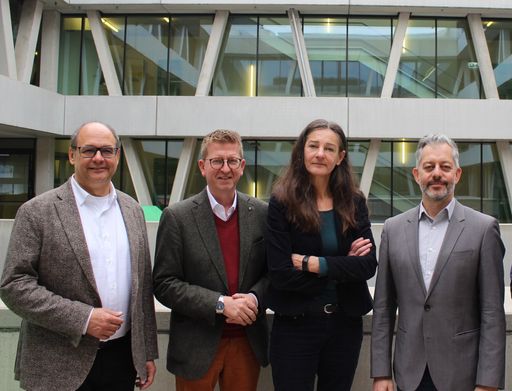The sector of private universities has grown by 167% in the last ten years; it currently covers 5% of the tertiary education sector in Austria and has 21,554 study places. At 51%, these institutions together have a much higher proportion of international students than public universities and technical colleges.
“We now provide 29% of study places in medicine and 27% of study places in the arts. The rapid growth of our sector is due to a clear service orientation, efficient resource management and impressive research achievements,” said Karl Wöber, 1st Deputy Chairman of the ÖPUK.
The board particularly pointed out the strict quality checks carried out by the federal authority, AQ Austria, and the economic efficiency in financing the study places.
“For over two decades we have been bringing students, teachers and researchers from all over the world to Austria, improving the domestic scientific performance and making a significant contribution to the creation of value at the location. We close gaping training and care gaps for many professional groups, for example in medicine and teaching. Our services to the location are obvious, but are not sufficiently recognized. We have therefore formulated six concrete demands for the coming government,” said the chairman of the Austrian Private Universities Conference, Martin Rummel, in today’s press conference at the Concordia press club.
- Inclusion of representatives of universities and colleges organized under private law in all educational strategy committees (such as FWF, FFG, AQ Austria, AGs of the BMBWF…).
- Financing study places for professions with a shortage: The federal funding ban and the needs test must be suspended for training in shortage occupations (especially those that are offered in cooperation with public universities) (e.g. teaching or medical studies).
- Better “distribution of work” in the tertiary sector: In order to make the best possible use of all training resources at the university location, applicants who have been rejected at public universities and technical colleges due to capacity limits should be made aware of the private law courses on offer. The number of study places at state-financed universities and technical colleges, which are limited in number, should be given primarily to financially disadvantaged students.
- Being allowed to name what is: university or college: Not all of the 19 institutions that belong to this sector are private; a good number are supported by federal states or foundations. Universities and colleges organized under private law that are majority owned by public corporations must be able to replace the designation “private university” or “private college” with the mandatory name of the financing corporation, e.g. “University of the State XXX” or “University of the State XXX” .
- Equivalent eligibility to apply: In general, private law institutions must also be eligible to apply for all calls for research projects for which public universities are entitled to apply (e.g. calls for tenders for bilateral research collaborations). Members of European university alliances must be allowed to receive financial support to promote these collaborations.
- Accreditation as accompaniment: The accompanying and negotiating character must also apply to the accreditation procedures for private universities and colleges. AQ Austria currently does not see itself as supporting scientific and infrastructural quality assurance through experts, but rather as an official approval body. It is therefore important to change the procedures accordingly.
Furthermore, we call for a differentiation of the methods of the institutional extension of accreditation if an institution has met the requirements of accreditation twice or for at least fifteen years.
In order to implement the demands, a good part of it requires communication at eye level and respect for the services of the sector; legal adjustments are only necessary for a small part. In this sense, the ÖPUK is looking forward to fruitful cooperation not only with the public universities and technical colleges, but above all with the upcoming government coalition, the board said in unison.
OTS ORIGINAL TEXT PRESS RELEASE UNDER THE EXCLUSIVE RESPONSIBILITY OF THE SENDER FOR CONTENT – WWW.OTS.AT | PUK
